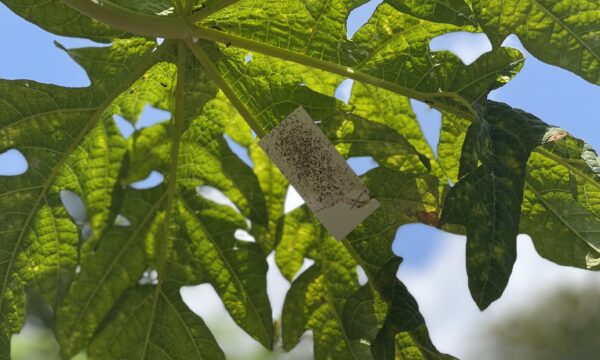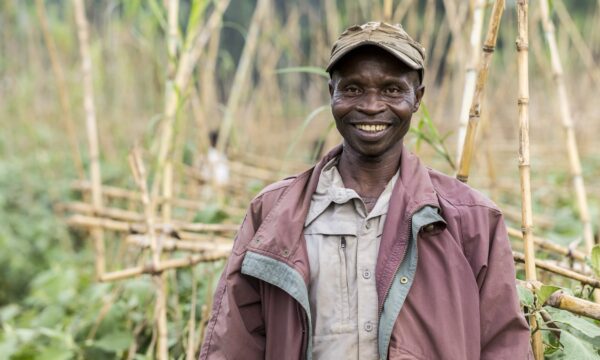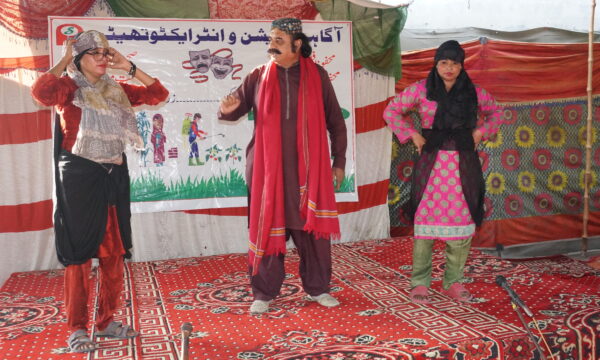“We have a problem with the attack of mealybugs, which are becoming a menace to the production of papayas. I fight them, but they are also fighting back.” Ben is a farmer in Machakos County, Kenya, east of the nation’s capital, Nairobi.

Like many other smallholder farmers in Kenya, he faces a constant battle with papaya mealybugs. The invasive pest is spreading across the country, wreaking havoc on key horticultural crops. The papaya mealybug spread to Africa in the 2000s from Central America and was first reported in Kenya in 2016. It can destroy a whole crop if left unmanaged.
To try and control the pest, farmers are turning to hazardous pesticides. However, they are often ineffective. They also damage local biodiversity and pose human health risks.
However, a tiny parasitic wasp is providing a safe and natural solution.
CABI PlantwisePlus and partners* are intensifying efforts to combat the destructive papaya mealybug (Paracoccus marginatus).
This new PlantwisePlus video shows how classical biological control is helping farmers in Kenya overcome the papaya mealybug on their farms.
The impact of papaya mealybug
For some farmers, like Omar Mwandaro, a farmer in Kwale County, the papaya mealybug damage almost led him to give up cultivating all together.
“A few years ago, I was a very unhappy farmer. I found 30 papaya trees completely destroyed,” Omar comments.
He goes onto say, “To try and control the mealybugs, we were using pesticide, but they didn’t work,”. Omar isn’t the only one.

An agricultural extension officer advised Melissa Awino, a smallholder farmer in Kilifi Country, to cease spraying pesticides on her farm. “The chemicals are also harmful to us,” she said.
Overuse and overreliance of hazardous chemicals has led to detrimental effects on biodiversity. And the elimination of native pollinators and natural predators of pests.
Chemical pesticides can also be expensive and pose a threat to human health. Farmers bear additional expenses acquiring chemical pesticides in a bid to salvage their crops. These pesticides are sometimes non-registered products. What’s more, the substances are often mishandled and improperly disposed of.
Parasitoids: The solution to protect papaya farms?

Kenyan farmers are fighting back through the release of a natural enemy, a form of classical biological control (CBC). The tiny parasitoid, known as Acerophagus papayae, is being used to manage the papaya mealybug through an Integrated Pest Management (IPM) approach.
“Classical biological control is very safe. It is very cost-effective because once it is established in the system, it is self-replicating,” notes Johnson Nyasani, Chief Research Scientist at KALRO.
A. papayae is a tiny parasitic wasp that attacks the papaya mealybug by laying eggs on the pest. Rearing is an essential step in biological control to guarantee its safe usage. This takes place under laboratory conditions.
After releasing the parasitoids, agricultural experts recommend that farmers construct a Natural Enemy Field Reservoir (NEFR). A NEFR is a simple, economical way for farmers to breed high quantities of natural enemies on their farms to help control specific pests.

Rama Hamisi is an Agricultural Extension Officer based in Kwale County. With the introduction of parasitoids, he has witnessed crops thriving. “Pawpaws** are shining and green in colour,” he says.
Farmers having access to a NEFR means they have the pest control on-site. This means CABI doesn’t need to continue coming back to farms to release more; the solution is already in the area. Therefore, farmers are advised to grow more papaya.
Safeguarding smallholder livelihoods
With the increased spread and proven efficacy of the classical biological control agent in coastal counties in Kenya, farmers see the fruits of their labour. They’re saving both money and time with this new method of control. This further spurs them to grow more papayas in the future.
“I want to fill this place with papayas,” affirms Melissa, now with the parasitoids at her farm.
Similar experiences have been felt by Omar. “I believe that my children’s education will be guaranteed, and also my life will be transformed compared to how I previously lived.”
PlantwisePlus aims to support small-scale farms by enabling them to decrease reliance on high-risk agricultural outputs. Empowering farmers means they can generate a sustainable income.
“We need farmers who can produce to meet the growing population’s demand,” observes Ben. In the future, Machakos County will implement biological control measures.
“If I get [the] control, I will be able to feed more people and get more profits on my side,” Ben continues to say.
PlantwisePlus and its partners will broaden the implementation of biological control throughout Kenya. This means more farmers like Melissa, and Omar will be able to reduce harmful pesticide use. And improve yields and their incomes.
This is the first step in a long journey. The invasive papaya mealybug continues to be an issue for farming communities in neighbouring countries. PlantwisePlus is actively exploring the adoption of biological control in these countries.
Learn more about CABI’s work around the papaya mealybug
Natural enemy fight increased against papaya mealybug in Kenya
Kenyan farmer perceptions of biological control of papaya mealybug
Could biological control solve the papaya mealybug problem for Ugandan farmers?
PlantwisePlus gratefully acknowledges the financial support of the Directorate-General for International Cooperation (DGIS), Netherlands; European Commission Directorate General for International Partnerships (INTPA, EU); the Foreign, Commonwealth & Development Office (FCDO), United Kingdom; and the Swiss Agency for Development and Cooperation (SDC).
Find out more about PlantwisePlus in Kenya.
All images are ©CABI
* To implement the biological control of papaya mealybug in Kenya, PlantwisePlus has partnered with the Kenya Agricultural and Livestock Research Organization (KALRO), Kenya Plant Health Inspectorate Service (KEPHIS), and the National Museums of Kenya.
** Pawpaws is another name for papaya.
1 Comment
Leave a Reply
Related News & Blogs
‘Sowing the seeds’ for food security in Uganda: CABI supports training for Quality Declared Seed production
CABI has been working with Zirobwe Agali-Awamu Agribusiness Training Association (ZAABTA), the Ministry of Agriculture, Animal Industry and Fisheries (MAAIF), the National Agricultural Research Organisation (NARO), and Integrated Seed Sector Developmen…
21 May 2025





Very interesting, how can I do parasitoids?
Need to help some papaya farmers facing the same problem